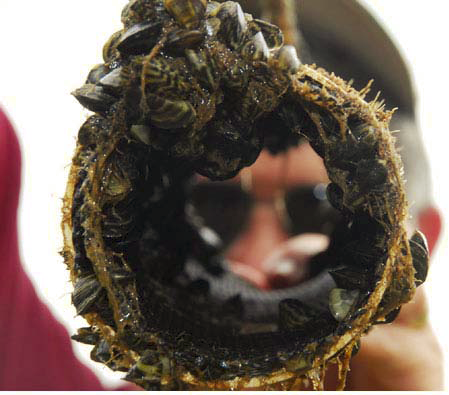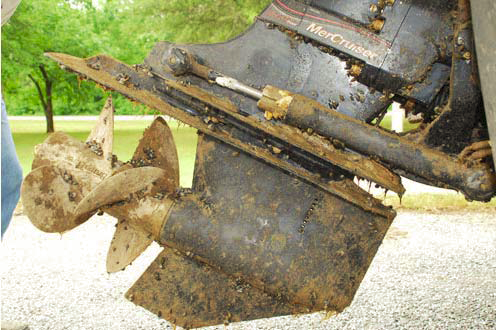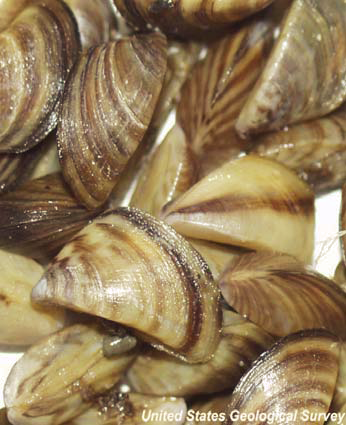In spite of a new state regulation designed to protect Texas’ drinking water supply, it appears that the threat from a highly invasive and destructive mollusk has taken a
hold on North Texas and is moving closer to the Brazos River Basin. The law that went into effect in May requires Texas boaters to remove all water from their vessels after
using certain lakes and rivers in an effort to stem the spread of zebra mussels. But Texas Parks and Wildlife officials say the outbreak has spread to several North Texas reservoirs due to contaminated
watercraft and if left unchecked could affect drinking water systems throughout the state.

Though the mussel has not yet been found in any Brazos River Authority water supply reservoirs, according to an
article published in the Dallas Morning News, zebra mussels are slowly spreading south and have invaded Lake Ray Roberts in the Trinity River Basin. As a result, the mollusk is expected to wreak
havoc on drinking water in both Dallas and Denton. The mussel had previously been found in areas from Interstate 44 in Wichita County to the Arkansas border, according to the Texas Parks and Wildlife Department.

Zebra mussels were first found in Lake Texoma in 2009. Since that time, the North Texas Municipal Water District has had to quarantine the lake from its other reservoirs resulting in six
counties losing an estimated 28 percent of their water supply. The district is now expected to spend an estimated $300 million to treat the water for mussels.
The mussels do not directly affect water quality, according to
Texas Parks and Wildlife. The greater threat is to water supply through damage to water intake and treatment systems. Zebra mussels multiply rapidly and coat any hard surface, attaching
themselves to the sides of intake structures, dams and water pumps, eventually clogging the system and requiring costly repairs.
TPWD officials blame unknowing boaters with the spread of the mussel as infected water from bait buckets, livewells, bilges and other receptacles that contain lake or river water are transferred
to an unaffected area.

Zebra mussels, which originated in Russia, have spread to rivers and lakes across Europe and 29 states in the US. The mollusks reproduce rapidly and when introduced into a
nonnative ecosystem, they consume nutrients that affect the food chain for fish and other aquatic life native to the area.
Besides Lake Texoma, the mollusks have been found in a stream that feeds Lake Lavon near Dallas. Recent tests found the mussel’s DNA in six lakes: Eagle Mountain, Lewisville, Ray Roberts, Arrowhead, Bridgeport
and Caddo, according to the TPWD. However the mussels do not appear to have become established at these lakes. Though none have been found in Brazos River Basin lakes, if left unchecked, the spread is
inevitable.
Currently, the only way to prevent the spread through the state is for boat owners to be extremely conscientious about inspecting, cleaning, draining, and drying their boats before moving them to another lake
from infested waters.
Realizing the risks for serious damage to Texas lakes, state lawmakers have set penalties ranging from fines to jail times for those convicted of possessing or transporting zebra mussels and other
potentially harmful aquatic creatures. Click here to read the statute on this issue.
To help prevent the mussels spread, here are some other suggestions for boat operators:
- Clean all vegetation, mud, algae and other debris from the boat and trailer.
-
Dry the vessel and associated equipment for 7 to 10 days from May through October or for 15 to 20
days from November through April. These drying times are approximations, and factors such as cooler
air temperatures, higher humidity and whether or not the vessel is kept in dry storage should be
considered.
-
Power-washing with water that is at least 140 degrees Fahrenheit, along with flushing the motor,
bilges, livewells and other water intake systems with 140-degree water will help kill the mussels. To be
effective, the water coming out of the flushed systems needs to reach 140 degrees to ensure the entire
system was exposed.
If it is not possible to clean internally using 140-degree water, using straight vinegar or a chlorine bleach and water solution (one-half ounce bleach to one gallon water) can be effective at killing zebra mussels as long as
the mixture is kept in contact with the mussels for 20 to 30 minutes.
Once the treatment is complete, clean water should be used to flush the chemicals and dead mussels from the boat. Boat owners should check with their manufacturer to be sure using
these chemicals will not void their warranties.
To learn more about the new regulations, please click here. A video showing how to decontaminate a boat can be viewed by clicking here. For more information on zebra mussels and other invasive aquatic
species in Texas, click here.